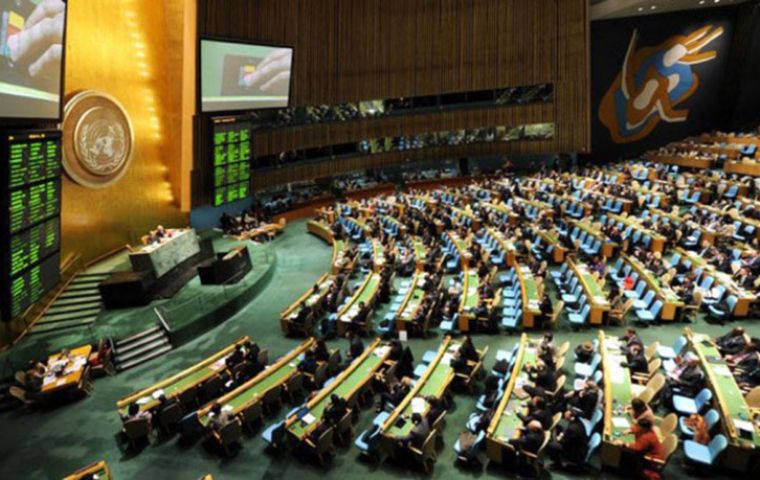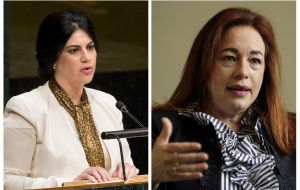MercoPress. South Atlantic News Agency
Two ladies, Ecuador and Honduras, dispute the presidency of the UN General Assembly
 The selection of the assembly president follows an unwritten system of regional rotation, and this year it’s the turn of Latin America and the Caribbean to preside
The selection of the assembly president follows an unwritten system of regional rotation, and this year it’s the turn of Latin America and the Caribbean to preside  The Assembly will vote between Honduras UN Ambassador Mary Elizabeth Flores Flake or Ecuador foreign minister María Fernanda Espinosa Garces
The Assembly will vote between Honduras UN Ambassador Mary Elizabeth Flores Flake or Ecuador foreign minister María Fernanda Espinosa Garces The new president of the U.N. General Assembly being elected Tuesday will definitely be a woman and only the fourth female in the 73-year history of the global organization, but whether she is from Honduras or Ecuador is the question.
The selection of the assembly president follows an unwritten system of regional rotation, and this year it’s the turn of Latin America and the Caribbean to preside over the 193-member world body for a year starting in September.
By tradition, the U.N.’s regional groups nominate a single candidate who is then rubber-stamped by the assembly. But this year the election is being contested for the first time since 1991, according to the U.N., because Latin American countries couldn’t agree on a nominee.
So the General Assembly will be voting to choose either U.N. Ambassador Mary Elizabeth Flores Flake of Honduras or Ecuadorean Foreign Minister María Fernanda Espinosa Garces to preside over the assembly, the U.N.’s most representative body.
While the presidency of the General Assembly is largely ceremonial, it is also prestigious and the world body does control the U.N. budget and adopts treaties as well as passes numerous resolutions that are not legally binding but generally reflect global opinion. It is also the U.N. organ where countries large and small can speak — and the scene of the annual gathering of world leaders in September, shortly after the new assembly session begins.
For the first time this year, the current assembly president, Miroslav Lajcak, who is Slovakia’s foreign minister, decided to follow a new practice that was also used to choose the current secretary-general, Antonio Guterres.
He invited both candidates to appear before assembly members for two hours May 4 to present their vision for the presidency and answer questions from diplomats and civil society representatives. The issues raised ranged from conflict prevention and financing U.N. goals for 2030 to ending poverty and preserving the environment to transparency in the president’s office, U.N. reforms, and gender equality.
Honduras’ Flores Flake said children’s issues would be a priority of her presidency, stressing the need for “safeguarding the world for the generations to come” and for using dialogue with a wide variety of people to advance discussions on how best to sustain peace.
Ecuador’s Espinosa Garces said she would focus on “delivery, implementation and accountability” to bring the U.N.’s work closer to people everywhere and convince them that what the United Nations does “touches upon their daily lives.”
Diplomats said the views of their two governments would also likely play a significant role in Tuesday’s voting.
One issue they pointed to that could have an impact is December’s General Assembly resolution condemning the United States for recognizing Jerusalem as Israel’s capital, which was adopted overwhelmingly. Ecuador supported it. Honduras was one of only nine countries that supported the U.S. and voted against the resolution, a decision that angered Palestinian supporters.
Whoever wins will join the short list of female assembly presidents that began in 1953 with Indian diplomat Vijaya Lakshmi Pandit, the sister of Prime Minister Jawaharlal Nehru and aunt of later Prime Minister Indira Gandhi. She was followed by Angie Elisabeth Brooks of Liberia in 1969 and Sheikha Haya Rashed Al Khalifa of Bahrain in 2006.




Top Comments
Disclaimer & comment rulesCommenting for this story is now closed.
If you have a Facebook account, become a fan and comment on our Facebook Page!